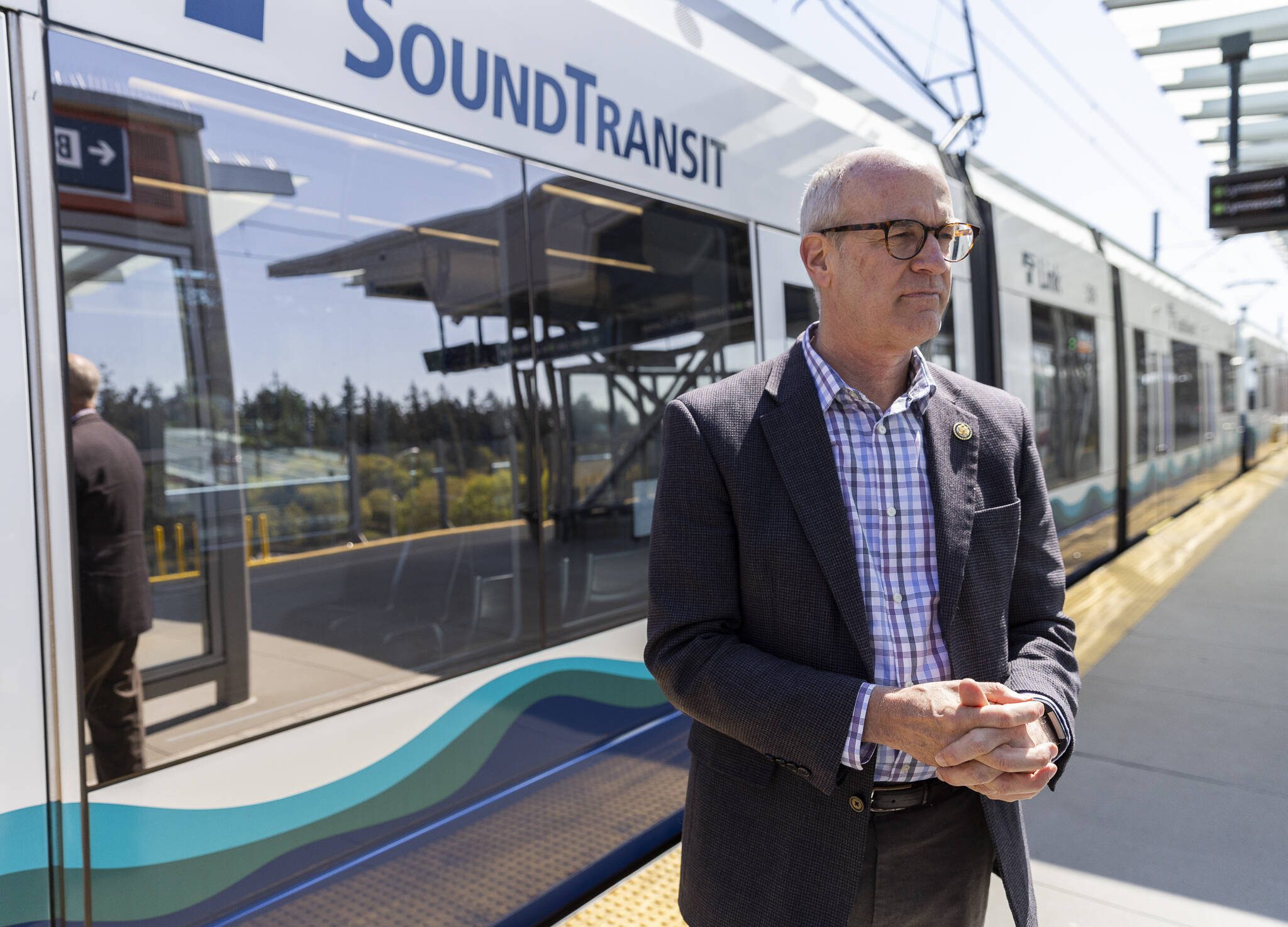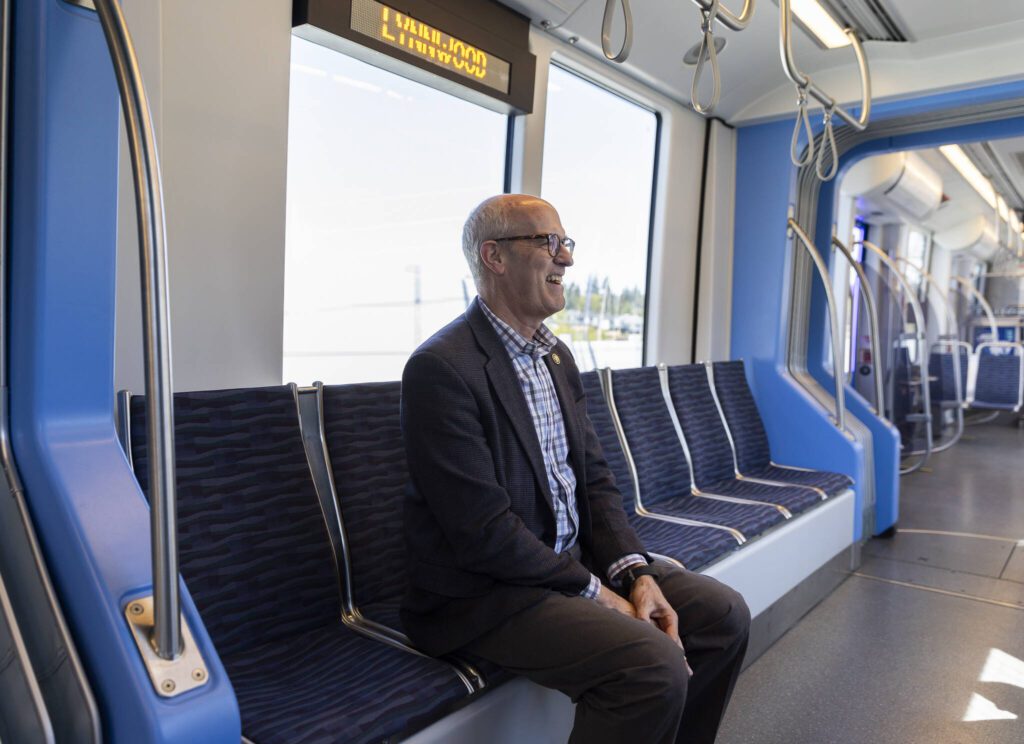LYNNWOOD — U.S. Rep. Rick Larsen, D-Everett, stepped from the platform at Mountlake Terrace Transit Center onto the light rail train bound for Lynnwood City Center on Wednesday afternoon.
This wouldn’t have been possible eight months ago — or without more than $1 billion in federal funding.
Now that the light rail extension from Northgate to Lynnwood is complete, Sound Transit is looking forward to another extension to Everett.
But funding for this project, and other transportation projects throughout the county, may be in jeopardy. The U.S. Department of Transportation is currently reviewing 3,200 grants previously awarded by the Biden administration.
“This administration wants to build roads and bridges and highways. They are not interested in building out transit and transit rail in places like the Pacific Northwest or other areas of the country, despite the fact that we’ve seen successful ridership increases in our system,” Larsen said during a Sound Transit Link ride with The Daily Herald.
This week, Larsen has been meeting with stakeholders around the 2nd District to hear their priorities for the surface transporation reauthorization bill. It’s part of his work with the U.S. House Transportation and Infrastructure Committee. The bill will run from 2026 to 2031, Larsen said, and it will “set the stage for making investments and policy on transportation for years to come.”
Snohomish County is the busiest county in Larsen’s district when it comes to transportation, he said, as it includes the light rail expansion, two ferry landings, Boeing, a freight corridor and the Amtrak passenger corridor.
A main priority in Snohomish County is the future light rail expansion to Everett Station. It’s currently slated for completion by 2041. The expansion could cost about $6.1 billion, Larsen said, and federal funding will be a key part of that. In addition, construction inflation is impacting Sound Transit’s ability to build out fully, he said.
Another large transit project in the county is Community Transit’s Swift Gold Line, which would connect Everett, Marysville and Arlington. A large piece of federal funding for the Swift lines comes from the Capital Investment Grants Program.
“The CIG money is really important and useful,” Larsen said. “And again, it’s transit related, and this administration so far hasn’t shown a real willingness to support large scale investment in transit, despite the fact that there’s a lot of people using it.”
Later Wednesday afternoon, Larsen hosted a roundtable at Lynnwood City Hall with Snohomish County leaders to hear about current surface transporation projects and federal funding priorities.
Federal funding makes up 18.5% of Community Transit’s budget, CEO Ric Ilgenfritz said. Without a strong federal partnership, Community Transit would struggle with basic functionality of its Swift lines and building out the Gold Line, Ilgenfritz said. Community Transit also has given itself 20 years to make a transition to a fully zero emissions fleet, which would be much more difficult without federal support.
In Everett, replacements are in the works for Edgewater Bridge, Merrill and Ring Creek Bridge and Marshland Bridge. The city also receives federal funding for Everett Transit and basic infrastructure and road improvements.
On a county level, Snohomish County Public Works Director Kelly Snyder said a main concern is the light rail expansion. Two of the planned stops — Ash Way and Mariner — would be in unincorporated Snohomish County. The county is thinking about building roads and other projects that would provide easier access to these light rail stations.
Construction inflation is impacting the county’s ability to complete projects, Snyder said. The county uses 10 federal funding sources for its projects, totalling about $140 million.
“Because of the 1,600 miles of road the county has to manage and over 200 bridges, it sort of caused me deep pause to think about how we’re going to fund those,” Snyder said.
In Lynnwood, the city is preparing for continued growth from the light rail. Part of the extension includes a new station near Alderwood Mall. The city hopes to make improvements to the area to make it more pedestrian friendly, which would cost about $40 million, said Lynnwood City Engineer David Mach.
“How do cities our size come up with the kind of funding we need to build these large projects?” he said. “We have certain resources, but it’s not enough to get us all the way there.”
A number of community leaders raised concerns about losing funding from the Safe Streets and Roads For All Grant Program. The Trump administration has recently put a “really fine microscope” on bike and sidewalk infrastructure projects, Larsen said.
Of the 40,000 highway and roadway deaths nationwide in 2023, about 20% involved someone who was walking or riding a bike. Larsen said he plans on emphasizing this data to Republicans who may otherwise be wary of funding pedestrian infrastructure projects.
“It doesn’t have to be about the environment,” Larsen said. “It doesn’t have to be about being healthier by walking around. It can be about just having a life that you get to live because you’re not dead.”
The Puget Sound Regional Council is working with tribes in the area to secure federal funding for pedestrian improvements, said council spokesperson Robin Koskey. Native American pedestrians are nearly seven times more likely to die in a crash than white pedestrians, she added.
Stanwood City Administrator Shawn Smith spoke about the difficulties in securing federal funding as a smaller city.
“Stanwood is small, so we tend to get smaller grant amounts,” Smith said. “It costs us. If the grant isn’t a million dollars, it’s almost not worth doing it because it costs us so much to hire the consultants to manage it.”
Other projects stakeholders mentioned included the Highway 99 improvement project in Edmonds and Lynnwood, the State Route 525 Bridge over the BNSF railroad in Mukilteo and ferry electrification.
An online portal for stakeholders to submit their priorities for the surface reauthorization bill is open through the end of the month. Then, committee members will share their ideas, followed by other members of the U.S. House.
“We’re not waiting,” Larsen said. “We’re not waiting for the Senate or the White House. They’ll come along, I’m sure, but we’re trying to build a momentum that has its own momentum to get this thing done.”
Jenna Peterson: 425-339-3486; jenna.peterson@heraldnet.com; X: @jennarpetersonn.
Talk to us
> Give us your news tips.
> Send us a letter to the editor.
> More Herald contact information.


























